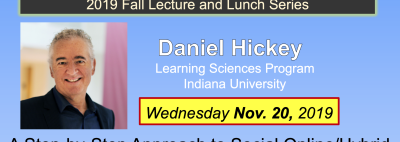

Center for Science Technology in Education (CSTE) Fall lecture series
Contemporary social theories of learning are now well developed. But their practical implications for education are still emerging. This presentation will present practical guidelines for developing online and hybrid courses using social approaches to engagement, motivation, assessment, and credentialing. These guidelines are organized around nine core steps and two optional steps and do not require an understanding of social theories of learning and assessment. These guidelines emerged over a decade of design research. They have been applied successfully in secondary, undergraduate, graduate, & technical courses, credentialed & open courses, and cohort-based & self-paced courses. These guidelines can be implemented in any modern learning management system or using Google’s Coursebuilder, Sites, or Docs & Forms. Attendees will learn how to (a) maximize peer interaction and the impact of public instructor interactions, (b) minimize private instructor-student interactions and grading of student work, (c) use public reflections to efficiently assess engagement, (d) design effective formative self-assessments, and (e) design automated summative assessments that thwart cheaters. This will allow online instructors to teach larger sections while avoiding “burnout.”
Daniel Hickey is a Professor and Program Coordinator with the Learning Sciences Program and a Research Scientist with the Center for Research on Learning and Technology. He completed his PhD in Psychology at Vanderbilt University and completed a Postdoctoral Fellowship at the ETS Center for Performance Assessment. Dr. Hickey studies new approaches to assessing, motivating, and recognizing learning, mostly using cutting-edge technology. He has been deeply involved in research of Open Badges and other forms of web-enabled credentials since 2011. His research has been supported by the MacArthur Foundation, the US National Science Foundation, Google, the US Department of Education, and Indiana University.